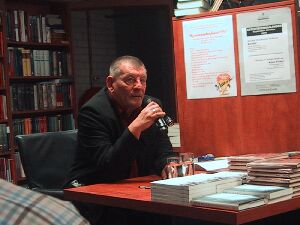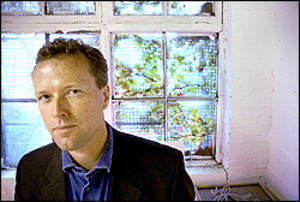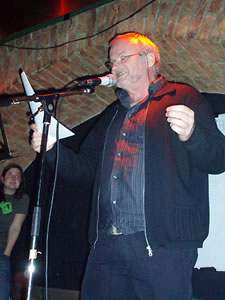De Nederlandse schrijver en dichter J. Bernlef werd geboren op 14 januari 1937 in Sint Pancras. Zie ook alle tags voor J. Bernlef op dit blog.
Naderend onweer
Heel in de verte nog
rolt iemand van de trap
Dronken verhuizer
die de rommelzolder
Volstapelt met duister
rondkolkend huisraad
Met bijl en snijbrander
nadert hij ons interieur
In de palm van zijn hand
nu vlak boven ons
Valt in een flits
zijn plan te lezen.
Uit het oog uit het hart
Als het iemand is
is het dus die iemand
die ons neerslaat
wegmaait, al ons gras
Ik ben niet bestand tegen dit
alles vernietigende beeld
Daarom leg ik een steen
in een doos, sluit de deksel
begraaf zo de stilte achter zijn naam
Als het iemand is
is hij hier niet
is hij die steen in die doos
ook niet.
Het laatste woord
Wantrouwen in grote woorden
in kleine woorden, voegwoorden
tussenwerpsels, in het laatste woord
dat iedereen wil en niemand krijgt.
Een totale gespreksstop
met strenge straffen
tong uitrukken wel het minste.
Het paard langs de spoorbaan
staart de sneltreinen na
het gras wacht op de vallende nacht
de steen koestert zich in het lage licht.
‘Waarom hebt u mij verlaten?’
Wat een lachwekkende klacht!

J. Bernlef (Sint Pancras, 14 januari 1937)
De Japanse schrijver Yukio Mishima werd geboren op 14 januari 1925 in Tokyo. Zie ook ook alle tags voor Yukio Mishima op dit blog.
Uit: Fountains in the Rain (Vertaald door John Bester)
“The boy was tired of walking in the rain dragging the girl, heavy as a sandbag and weeping continually, around with him. A short while ago, in a tea shop in the Marunouchi Building, he had told her he was leaving her.
The first time in his life that he’d broken with a woman!
It was something he had long dreamed of; it had at last become a reality. It was for this alone that he had loved her, or pretended to love her; for this alone he had assiduously undermined her defenses; for this alone he’d furiously sought the chance to sleep with her, slept with her – till lo, the preparations were complete and it only remained to pronounce the phrase he had longed to pronounce just once with his own lips, with due authority, like the edict of a king:
“It’s time to break it off!”
Those words, the mere enunciation of which would be enough to rend the sky asunder…those words that he had cherished so passionately even while half-resigned to the impossibility of the fact…that phrase, more heroic, more glorious than any other in the world, which would fly in a straight line through the heavens like an arrow released from its bow…that spell which only the most human of humans, the most manly of men, might utter…in short:
“It’s time to break it off!”

Yukio Mishima (14 januari 1925 – 25 november 1970)
De Amerikaanse schrijver John Dos Passos werd geboren op 14 januari 1896 in Chicago. Zie ook alle tags voor John Dos Passos op dit blog.
Uit: The Big Money
“Their first child was born in December. It was a boy. They named him Wheatley. When Gladys came back from the hospital instead of coming back to the apartment she went into the new house out at Grosse Pointe that still smelt of paint and raw plaster. What with the hospital expenses and the furniture bills and Christmas, Charley had to borrow twenty thousand from the bank. He spent more time than ever talking over the phone to Nat Benton’s [his broker’s] office in New York. Gladys bought a lot of new clothes and kept tiffany glass bowls full of freesias and narcissus all over the house. Even on the dressingtable in her bathroom she always had flowers. Mrs. Wheatley said she got her love of flowers from her grandmother Randolph, because the Wheatleys had never been able to tell one flower from another. When the next child turned out to be a girl, Gladys said, as she lay in the hospital, her face looking drawn and yellow against the white pillows, beside the great bunch of glittering white orchids Charley had ordered from the florist at five dollars a bloom, she wished she could name her Orchid. They ended by naming her Marguerite after Gladys’s grandmother Randolph.”

John Dos Passos (14 januari 1896 – 28 september 1970)
Luis Quintanilla schilderde Dos Passos als zondagschilder
De Britse schrijver en journalist Edward St Aubyn werd geboren op 14 januari 1960 in Cornwall. Zie ook alle tags voor Edward St Aubyn op dit blog.
Uit: Some Hope
„Patrick walked toward the well. In his hand he carried a gray plastic sword with a gold handle, and swished it at the pink flowers of the valerian plants that grew out of the terrace wall. When there was a snail on one of the fennel stems, he sliced his sword down the stalk and made it fall off. If he killed a snail he had to stamp on it quickly and then run away, because it went all squishy like blowing your nose. Then he would go back and have a look at the broken brown shell stuck in the soft gray flesh, and would wish he hadn’t done it. It wasn’t fair to squash the snails after it rained because they came out to play, bathing in the pools under the dripping leaves and stretching out their horns. When he touched their horns they darted back and his hand darted back as well. For snails he was like a grown-up.
One day, when he was not intending to go there, he had been surprised to find himself next to the well and so he decided that the route he had discovered was a secret short cut. Now he always went that way when he was alone. He walked through a terrace of olive trees where yesterday the wind had made the leaves flick from green to gray and gray to green, like running his fingers back and forth over velvet, making it turn pale and dark again.
He had shown Andrew Bunnill the secret short cut and Andrew said it was longer than the other way, and so he told Andrew he was going to throw him down the well. Andrew was feeble and had started to cry. When Andrew flew back to London, Patrick said he would throw him out of the plane. Blub, blub, blub. Patrick wasn’t even on the plane, but he told Andrew he would be hiding under the floor and would saw a circle around his chair. Andrew’s nanny said that Patrick was a nasty little boy, and Patrick said it was just because Andrew was so wet.“

Edward St Aubyn (Londen, 14 januari 1960)
De Chinese schrijfster Anchee Min werd geboren in Shanghai op 14 januari 1957. Zie ook mijn blog van 14 januari 2009.
Uit: Red Azalea
„I was raised on the teachings of Mao and on the operas of Madam Mao, Comrade Jiang Ching. I became a leader of the Little Red Guards in elementary school. This was during the Great Proletarian Cultural Revolution when red was my color. My parents lived like–as the neighbors described them–a pair of chopsticks: always in harmony My father was an instructor of industrial technique drawing at Shanghai Textile Institute, although his true love was astronomy. My mother was a teacher at a Shanghai middle school. She taught whatever the Party asked, one semester in Chinese and the next in Russian. My parents both believed in Mao and the Communist Party, just like everybody else in the neighborhood. They had four children, each one a year apart. I was born in 1957. We lived in the city, on South Luxuriant Road in a small two-story townhouse occupied by two families. The house was left by my grandfather, who had died of tuberculosis right before I was born.
I was an adult since the age of five. That was nothing unusual. The kids I played with all carried their family’s little ones on their backs, tied with a piece of cloth. The little ones played with their own snot while we played hide-and-seek. I was put in charge of managing the family because my parents were in their working units all day, just like everyone else’s parents.
I called my sisters and brother my children because I had to pick each one of them up from kindergarten and nursery school while I myself was only a kindergartner. I was six when my sister Blooming was five, my second sister Coral was four and my brother Space Conqueror was three. My parents made careful choices in the names they gave us, They were considered eccentric because the neighbors named their children Guard of Red, Big Leap, Long March, Red Star, Liberation, Revolution, New China, Road of Russia, Resist U.S., Patriotic Forerunner, Matchless Red Soldier, etc. My parents had their own ideas. First they called me Lin-Shuan–Rising Sun at a Mountain. They dropped it because Mao was considered the only sun. After further contemplation, they named me Anchee–Jade of Peace. Also, it sounded like the Chinese pronunciation of the English word “angel.” They registered me with it. Blooming and Coral were named after the sound of chee (jade). There were two reasons why my parents named my brother Space Conqueror: one was that my father loved astronomy; the second was to respond to Mao’s call that China would soon build its own spaceship.

Anchee Min (Shanghai, 14 januari 1957)
De Amerikaanse schrijfster Mary Robison werd geboren op 14 januari 1949 in Washington D.C. Zie ook mijn blog van 14 januari 2009.
Uit: A Seasonal Thing
„I know there’s something big here. As soon as he calls I know. Judy knows too. It must be in my voice because she doesn’t ask when I hang up and reach for my jacket and keys. She stands and kisses me lightly on the corner of the mouth.
“We’ll talk,” I say.
She knows.
On the drive over it’s nagging me. Why am I even meeting this guy? He got what he wanted. Not like me. Why call me? Why now? I don’t even have any hair.
I park in the lot. He’s in town, I tell myself. It’s been a while. When a guy gets older he starts to think, I tell myself. That’s why. He just wants to catch up.
The choice is deliberate. We used to hang out at this place—Mickey’s, now, but then it was called Delorio’s—when we were kids. He must need something. I walk in. The place hasn’t changed much but I feel—and this bugs me—that this is no place that I should be. It’s early yet and the crowd is small: just a few young suits and a couple of perky-looking girls hovering around the taps. I walk past them and head toward the seating area in the back. He’s already at a table, already ordered a round even. He hasn’t lost any hair and I think that he probably won’t, either. I’m sorry I came.
He waves a Hollywood wave and perks up the corners of his mouth distractedly. His eyes are a brighter blue than I remember and his hair’s a deeper brown. He doesn’t stand to greet me or move to shake my hand. Instead he scoots his chair back a few inches from the table and gestures magnanimously toward the chair across from him. I sit.
At this moment I think that there is no one who knows me.
“How are you,” I say.
“Gin and tonic,” he says, pointing at the drink sitting on the table in front of me. I pick it up and sip from the glass. I hope that the coil in my stomach will stop tightening.
He launches right into some thing about Bogart movies and I think what nerve this guy has. Fifteen years and not even a hello. I sip my drink methodically, watching his eyes slither around the room, avoiding mine. When his eyes finally land on my face, my skin feels oily.
After the story he rolls his eyes around in his head like one of the Three Stooges. When he rolls them back into place a waiter appears with fresh drinks. I hadn’t notice mine was empty.
This waiter is young and looks it. His hair is thick and dark and hangs in his eyes. His skin is smooth and lineless. He probably works out and has a pretty blonde girlfriend with pink lips who won’t screw with the lights on.”

Mary Robison (Washington, 14 januari 1949)
De Oostenrijkse dichter en schrijver, musicus en cabaretier Martin Auer werd geboren op 14 januari 1951 in Wenen. Zie ook mijn blog van 14 januari 2009.
Uit: Das Kloster der Erleuchteten
„Im dreiundzwanzigsten Jahrhundert, in der ausklingenden Altzeit, lehrte in einem Erleuchteten- Kloster auf der Erde der Meister Deng Dsö-Ling, auch genannt der Dreizehnte Buddha oder der Meister des Eins-Seins.
Unter den zweitausend Mönchen, die bei ihm studierten, waren auch zwei Brüder Lu, von denen er den einen wie einen Heiligen verehrte, den anderen aber wie einen Teufel verabscheute. “Wie kann das sein?” fragten ihn eines Tages einige seiner Schüler. “Wie kann es sein, daß du den einen Lu wie einen Heiligen verehrst und den anderen wie einen Teufel verabscheust? Beide gleichen sich doch wie ein Ei dem anderen, beide sündigen in einem fort, huren und saufen und brechen die Klosterregeln, schlafen in den Tag hinein, fressen sich voll wie die Hunde und singen unzüchtige Lieder! Wie kannst du den einen verehren und den anderen verachten?”
Lange schwieg der Meister, dann sagte er: “Gebt mir drei Tage Zeit, dann will ich eure Frage beantworten”. Die Jünger zogen sich zurück, und der Meister fastete und betete drei Tage lang. Dann rief er seine Schüler wieder zu sich. Er ließ alle zweitausend sich im Klosterhof versammeln und begann seine Lehrpredigt, indem er die beiden Brüder Lu zu sich rief.
Lu dem Bösen versetzte er einige Stockschläge, aber vor Lu dem Heiligen kniete er nieder, legte seinen Kopf vor ihm in den Staub, ergriff mit beiden Händen seinen Fuß und setzte sich diesen auf den Kopf. Dann erhob er sich wieder und sprach zu seinen Jüngern: “Wahrlich, ihr habt mir eine ernsthafte Frage gestellt, und ich will sie euch ernsthaft beant worten. Wie kommt es, fragt ihr, daß ich den einen Lu wie einen Teufel verachte und den anderen Lu wie einen Heiligen verehre, wo sie doch beide huren und saufen und sündigen in einem fort? Doch seht sie euch an: dieser hier sündigt, weil er das Böse will. Er sündigt, weil er sich selber haßt, er tötet jeden Tag sein Gewissen. Er säuft den Wein, um sich zu erniedrigen, er schwängert die Jungfrauen, um ihre Unschuld zu zerstören, er singt schweinische Lieder, um unser Ohr zu kränken. Nun aber seht euch diesen an: Dieser hier weiß nichts von Sünde, er säuft den Wein, wie ein Kind an der Mutterbrust saugt, er schwängert die Jungfrauen, wie der Wind die Blüten bestäubt, er singt die schweinischsten Lieder, wie eine Nachtigall ihre Weisen pfeift. Er ist völlig eins mit der Sünde, und darum ist sie bei ihm wie Reinheit und Unschuld. Ich hoffe, ihr versteht”

Martin Auer (Wenen, 14 januari 1951)
Zie voor nog meer schrijvers van de 14e januari ook mijn vorige blog van vandaag.
